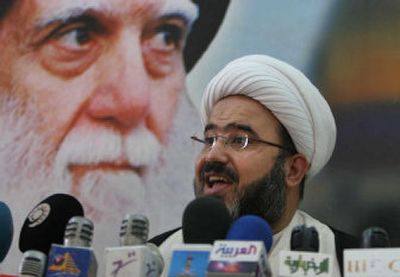Sunni leaders urge vote against federalism

BAGHDAD, Iraq – Angry over Shiite calls for regional governments, preachers in many Sunni mosques urged their followers Friday to register and vote in the October constitutional referendum – but against the charter if it includes measures to “divide the country” through federalism.
“We will say no to anything that leads to the division of our country,” Sheik Ayad al-Izzi told a congregation Friday in Baghdad’s Rashdiyah neighborhood. Sheik Mahmoud al-Sumaidaie urged worshippers in another mosque in the capital to reject federalism because “we are a unified nation.”
Oil riches, lost prestige and the influence of neighboring Iran are all at play as Iraqis grapple with federalism – a potential dealbreaker just days before Monday’s deadline for parliament to approve the new constitution.
“Matters are very complicated and need divine intervention” if the Monday deadline is to be met, Sunni Arab politician Saleh al-Mutlaq said Friday. He said that if the Shiites and Kurds steamroll a constitution unacceptable to the Sunnis, “it will be rejected by the people.”
The Kurdish minority has demanded federalism be enshrined in the constitution to protect the regional self-rule it has enjoyed in the north since 1991. Many Sunni Arabs, a formerly dominant minority, oppose federalism, fearing it would lead to the breakup of Iraq.
The head of the country’s biggest Shiite party, Abdul-Aziz al-Hakim, called Thursday for a Shiite federated region in central and southern Iraq – a statement that seemed to vindicate the worst fears of many Sunni Arabs.
Shiites form an estimated 60 percent of Iraq’s 27 million people, and al-Hakim’s party controls 146 of the 275 seats in parliament.
A Sunni backlash over federalism – if it ends up in the final draft of the constitution – could scuttle the Bush administration’s strategy for luring Sunni Arabs away from the insurgency and enabling the United States and its partners to begin withdrawing troops next year.
If two-thirds of the voters in three of the 18 provinces vote no in the referendum, the constitution would be defeated and the political process stopped dead in its tracks.
Sunni Arabs form about 20 percent of the population nationwide but are a majority in at least four provinces. By the same token, Kurds, about 15 percent to 20 percent of Iraqis, could defeat the constitution if it does not include federalism since they control three provinces.
Also Friday, a blast near a mosque west of Baghdad killed four people, including three children, and wounded at least 19 other people, police and hospital officials said. Iraqis blamed U.S. forces, but an American spokesman disputed the Iraqi claim.
The blast occurred on the outskirts of the town of Nasaf, near Ramadi, an insurgent center 70 miles west of Baghdad.